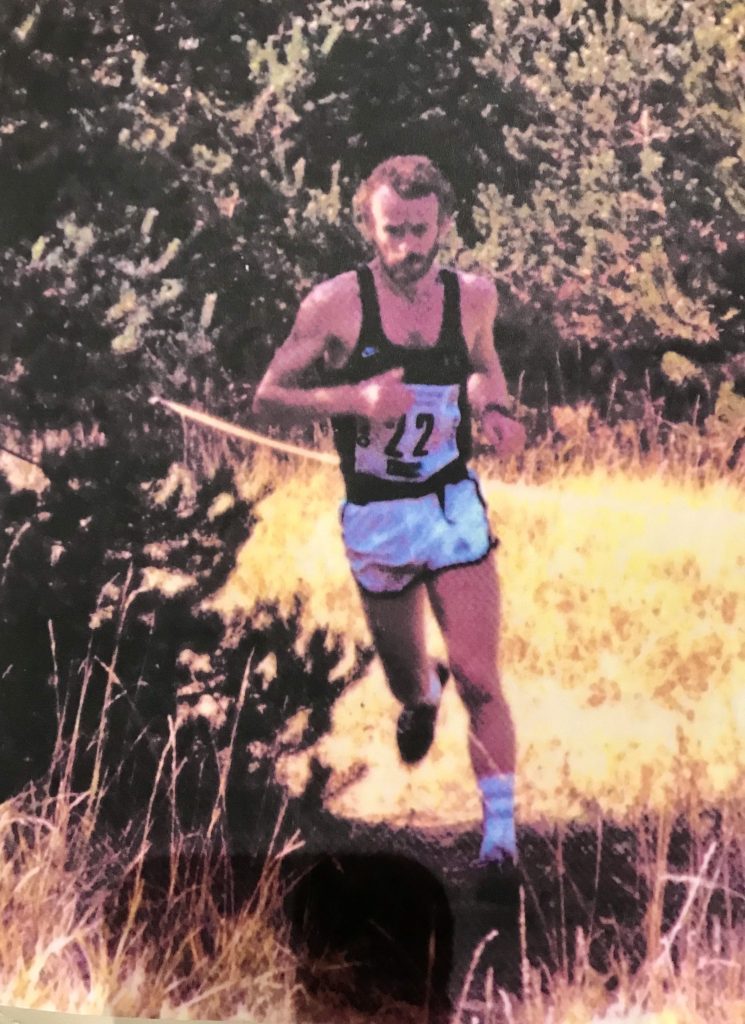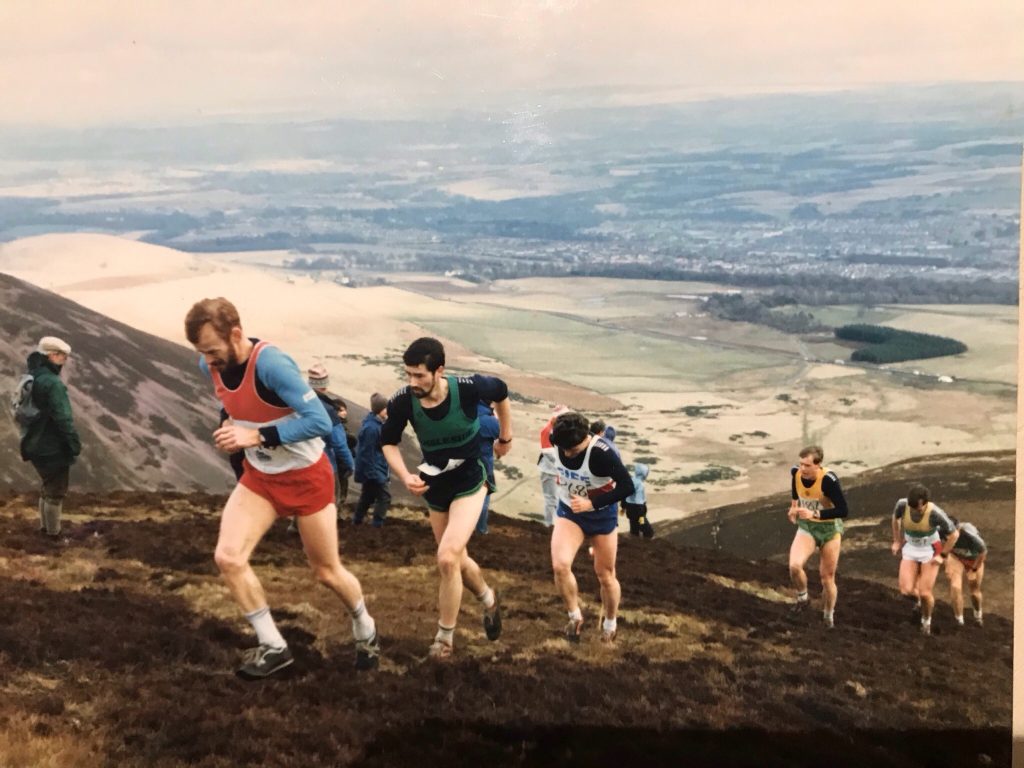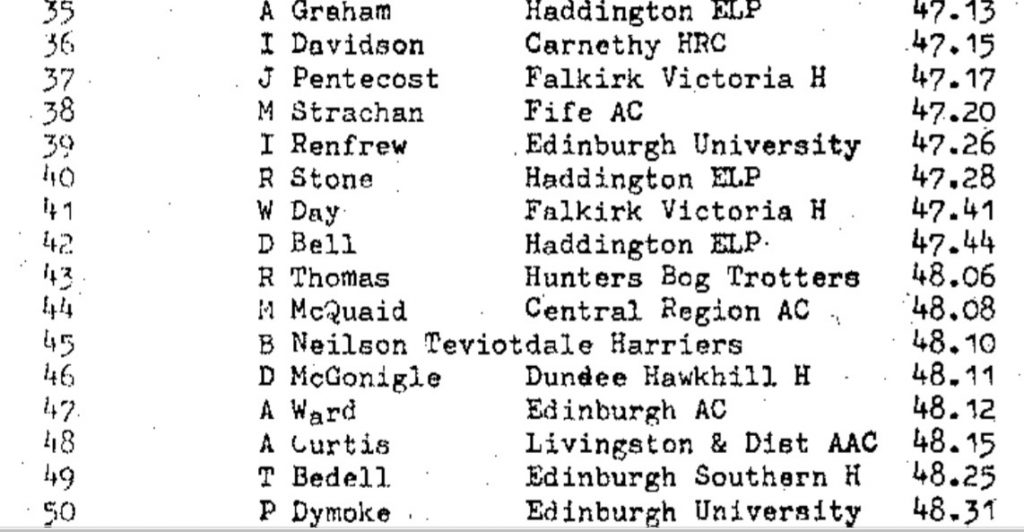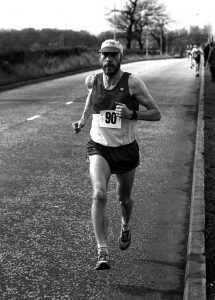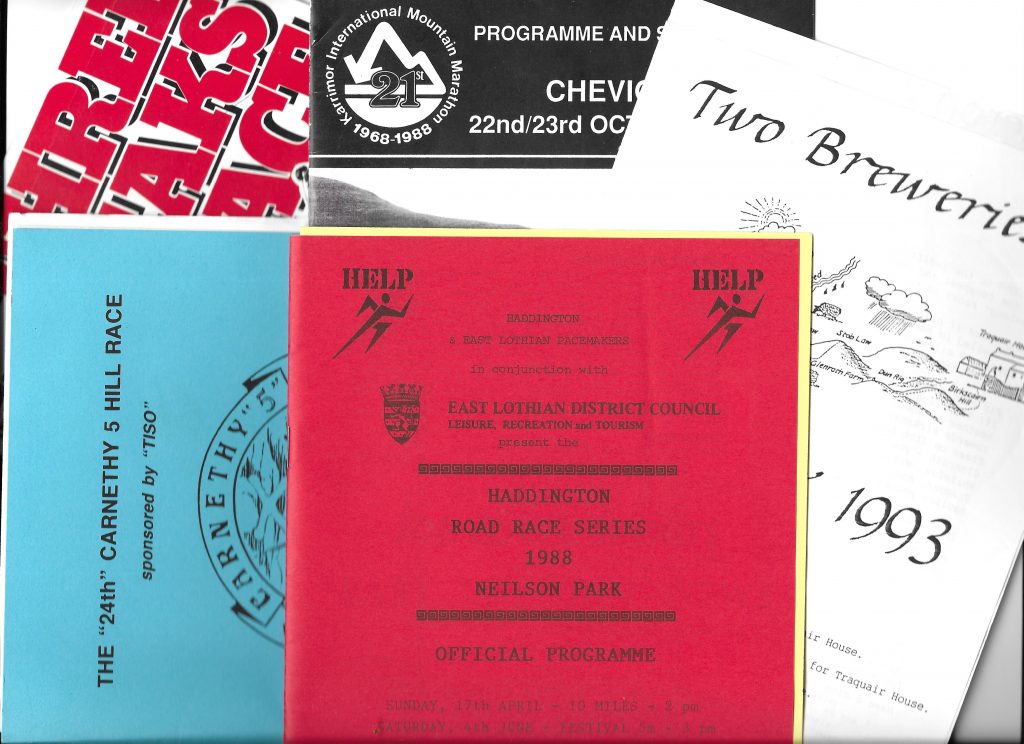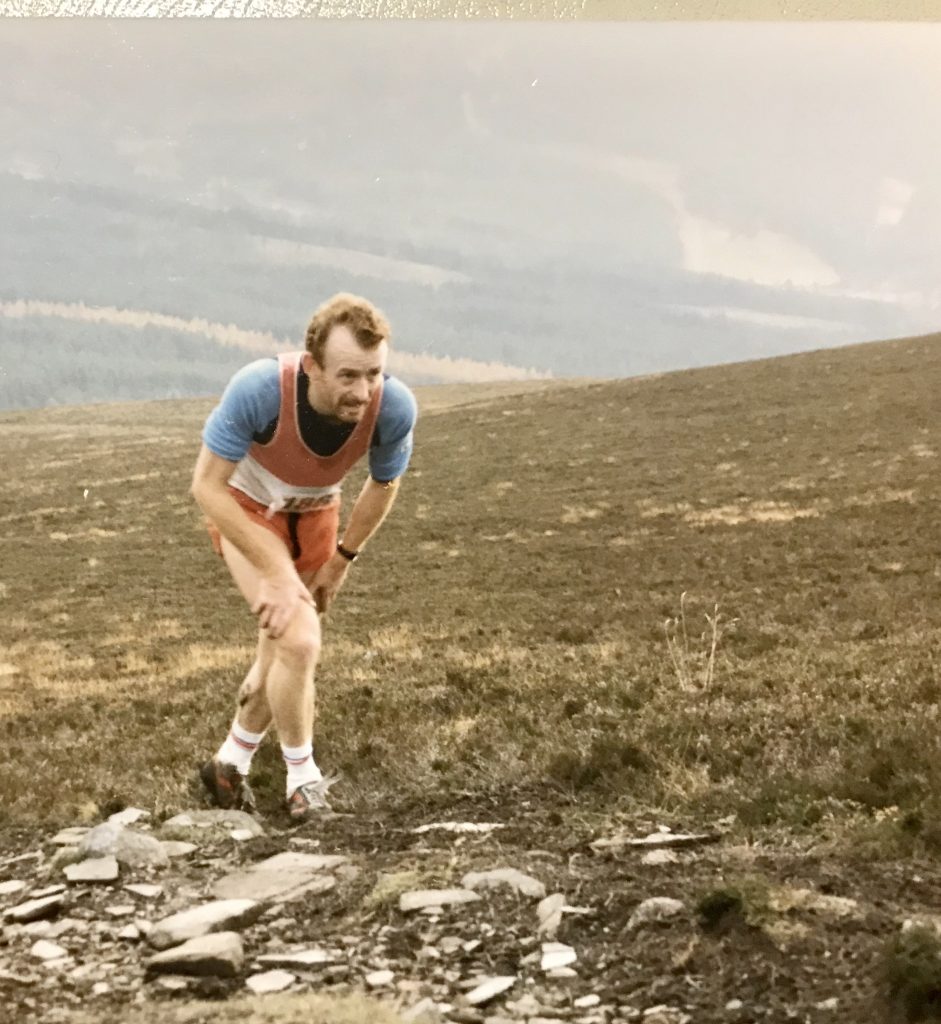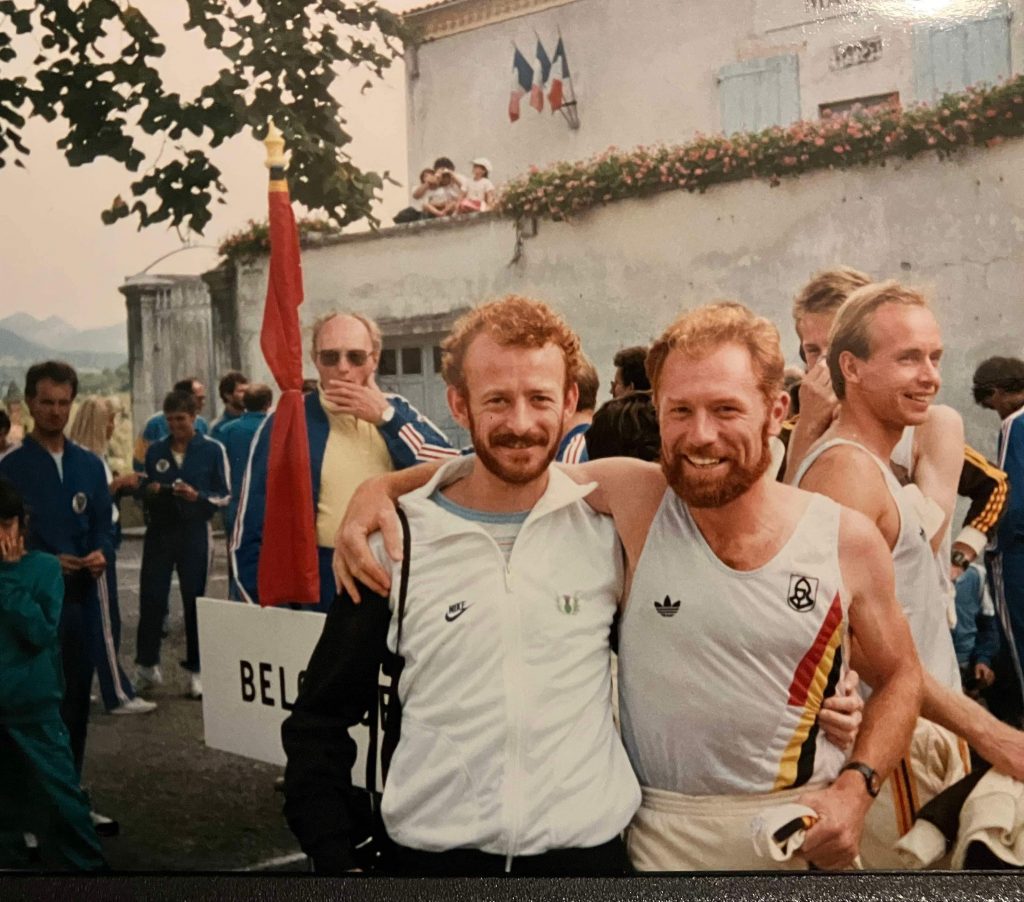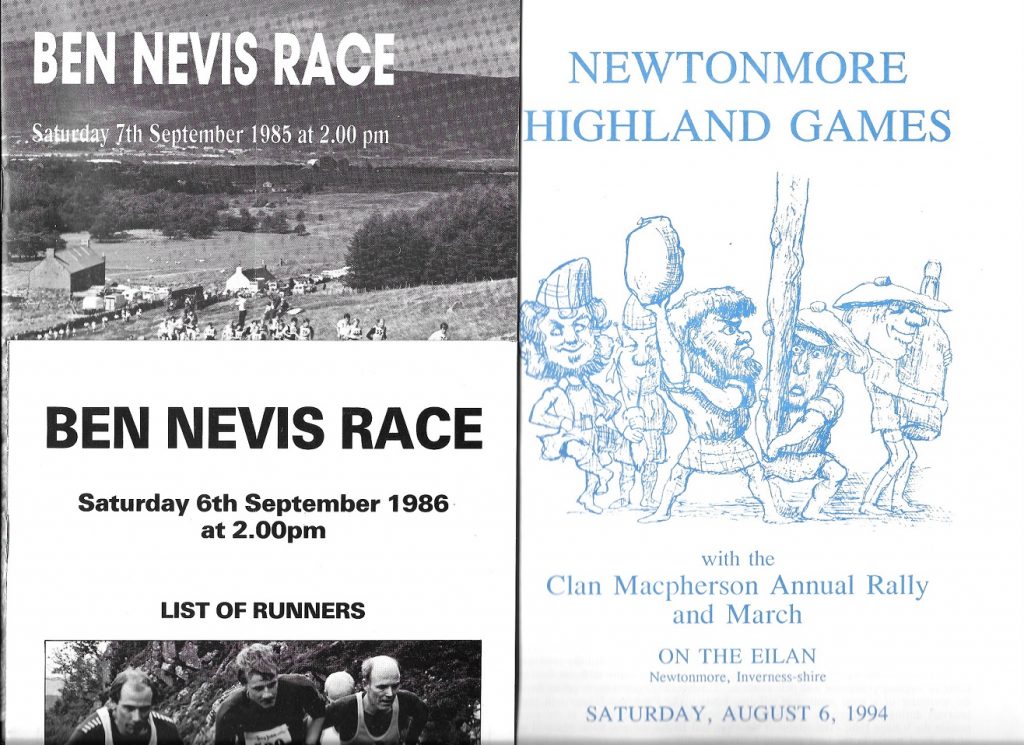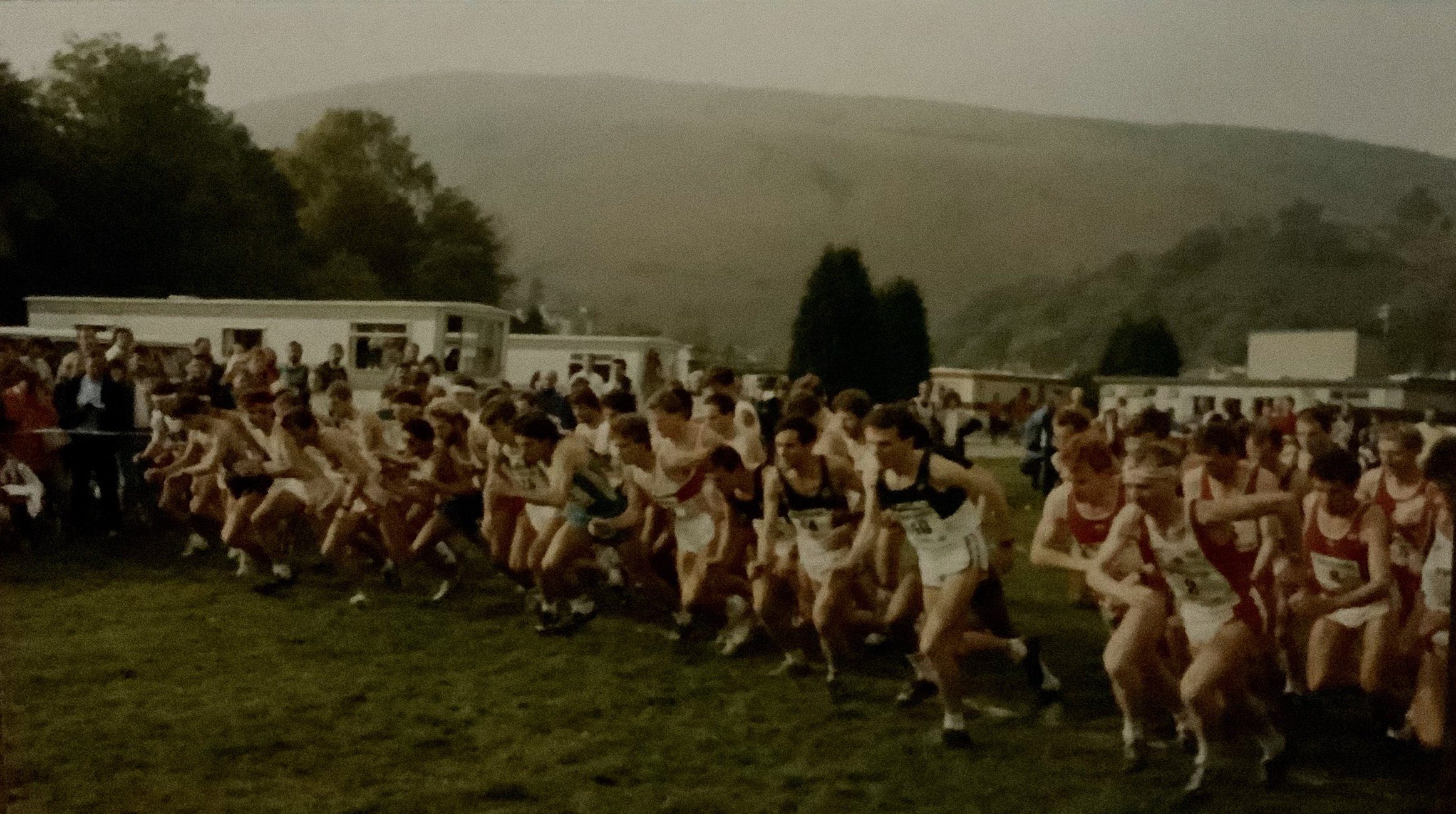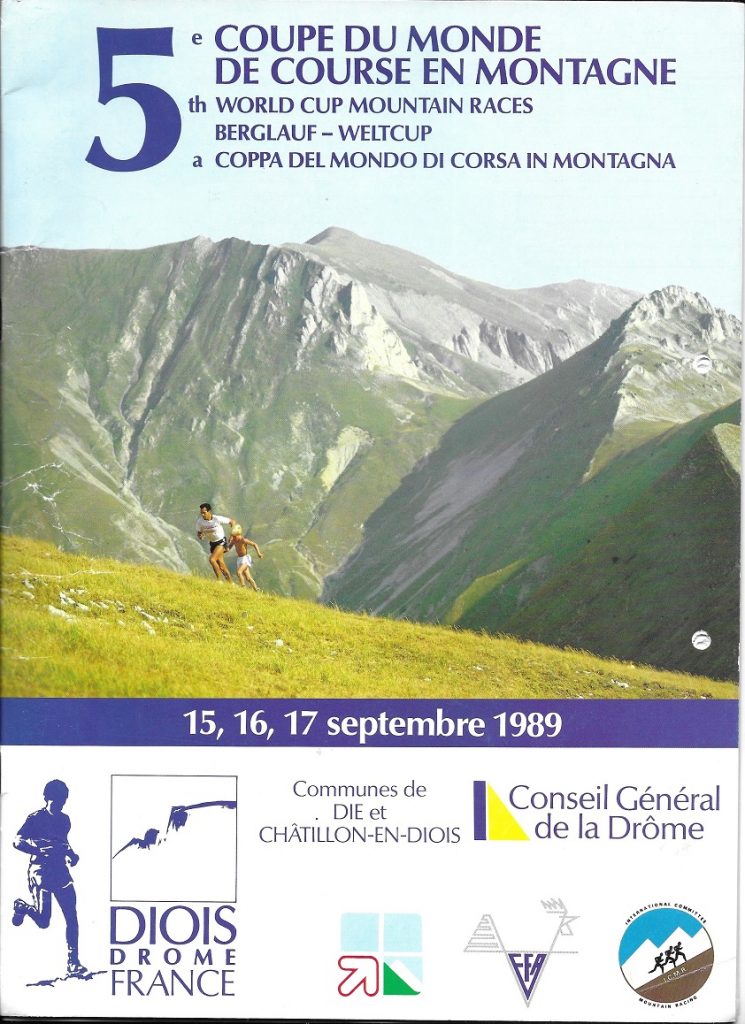When you first meet Denis Bell you are immediately struck by his energy, enthusiasm and dynamism. He exudes all three but a look at his cv says that this has always been the case. He tells us that as a pupil at primary school in Berwick he used to be able to run dozens and dozens of times around the playground. Then adds that these early signs subsequently lay well dormant for rather far too long! When the family moved to Haddington when he was 10, he attended Knox Primary School before going to Knox Academy. He found early on that he managed to do well at the Sports Day ‘Marathon where the short junior course was approximately two miles, and the longer seniors course another mile and a half. He goes on to say – “I won the junior marathon in second year and was second in the senior course in 2nd or 3rd year, then won it every year after (no training as such, a degree of natural ability to pace and sustain).
Got selected for 1500m interschools East Lothian, and was last out of 6 I think. Hopeless and not enthused! Of course we played rugby first sport, with football aside (often as town-area competing ad-hoc teams which were rarely 11-a-side but any number would do, ‘matched side by side’. The heady days of kick-aboot! Athletics and cricket were in the summer term. I really only ‘enjoyed’ the marathon (not quick enough on track events), liked spin bowling and fielding at cricket. Rugby, wing forward then scrum half, the indoctrination to being kicked about and getting hurt! I was a ‘prefect’ then ‘head-boy’ and House Sports Captain, Rugby Firsts captain, and Company Sergeant Major in the CCF.”
They were very active school days and the out of school life was not short on that front either. From a family of 6 children, Denis always worked part-time…. Like many another of his generation he went tattie picking in Berwick at 8 years old. Then there were all sorts of jobs going. It was the time when there were always part-time jobs for boys (and girls) and shops really did have ‘Smart Boy Wanted’ notices in the window from time to time. Denis had jobs on small holdings (berry picking) in summer) but for the rest of year all other duties were undertaken. These included jobs such as butcher’s boy, assistant in a delicatessen grocers, and 2 huge (4 bags) Sunday paper rounds.
Back at school there was of course the academic side of life. Despite all the work in school and out, he tells us that he “did eight o-levels one sitting, then seven Highers in one sitting, managed to get to Edinburgh University while still playing rugby for Haddington thirds and even, a couple of times, seconds …. ultimately nearly getting my neck broken, but all rib cage cartilages sprung (horrible!!) Went on to play football for a couple of seasons with Athelstaneford Bluebell and loved training and playing (only ‘reasonably’) for a few years ..started to see the effects of sprint shuttle training with pulse down at about 40…
So by the time he had left school and university he had enjoyed an action packed sporting life combined with a very successful academic career path. But how did he get into athletics, specifically running?
“When HELP Running Club was formed, I was living in a farm cottage with my wife Mary and doing some training in the fields. Realising that my times for ‘some indistinct distances’ were not far away from what club members were running in races, I decided to join them.” The club was formed in 1983 with Henry Muchamore one of the founding members and a great driving force behind the club which enjoyed great success from the mid-80’s to the late 90’s. “Joe Forte ‘got me going’ (Joe, a peer and excellent road runner, had supported me as I approached Snowdonia Marathon, and personally at Galloway and he had suggested I do the hills; Eddie O’Neill, Henry, Adrian Bone, George Armstrong, Dave Jones, Murray Scott, John and Helen Fyffe were all ultra supportive of my hill running aspirations…) From these early days, Denis stayed with the club for his entire career, and even when he moved across the country to Torrance, he wore the red and white vest. Henry sent out a circular at the start of each winter season with the races in which it was hoped (expected?) that the members would support. These included District and National relay championships and District and National championships. And Denis did indeed represent the club in those events. He says:
“I did a few road and Cross-Country races and was doing OK, but aiming for marathons. I had planned Glasgow, Edinburgh and London for my 30th year but lost my Dad just before my 30th birthday and that flattened me for 6 months or so. I had just done a ‘training hilly course’ in East Lothian as a trial and supported by Mary (and baby Lauren) got in in 2.36… Quite pleased.
I then did Edinburgh with my running pal and training partner (at times) Phil Beeson and we got a joint 2.34.30. I had planned on Snowdonia (with clubmate Adrian Bone) where I was third in about 2.43 after a shockingly naïve, inexperienced run with a colossal dehydration from about 24/25 miles (seeing psychedelic circles and shooting stars!!) and only managed to finish by following the kerbstones. The winner was Mike Neary and second, overtaking me in the last 1/2 mile was Malcolm Jones, an international Welsh hill runner, who never beat me again in the ‘hill races’! Mike was unemployed and doing 120 miles a week (de rigeur those days while I was doing about 75-80 but I had been doing some great workouts at Fa’side Castle near Tranent. My attitude at the time was about ‘compromise, family and work and training’ with the latter tending towards quality, speed and tough sessions, about 12 hours a week max, but doing 5 milers in just over 25m, 10 milers 52m, 1/2maras 1hr 15. .20 milers in 1hr50-2 hours (with Phil mostly). Hill rep sessions were solo and brutal with ‘virtually no recovery period between legs’ …it worked.
My last marathon was Galloway Milk Marathon, getting 4th just behind Dave Thomas (HBT) on a very tough weather day and stomach cramps last 3-4 miles…2.31.30?I had recognised that my running fitness was probably based on an 18 months ‘apprenticeship’, following my decent training and speed work from football.”
More a racer than a time trialist, it is nevertheless valid to ask him what his personal best times for standard distances were. He was unsure but suggested that his half marathon best was on the hilly Haddington course and he was clocked in at 1 hour 09 minutes, his best marathon was the one quoted above in 2:31:30 and he has no record of his best 10 miles but he had an unofficial 25:11 for five miles. He adds, “I recall that I did a lunchtime training run from Brunton’s Musselburgh and thought it was a ‘close’ 5 miler in 25.11 ( was pleased with that) … I think in the Scottish Cross-Country at Irvine I maybe squeezed into top 60 , when there used to be about 3000 runners (was Colin Donnelly 2nd or 3rd?) … can’t remember either on 1 mile (or 1500m) training only, but may have been about 4.30-4.40? ” What standard was that, well from the many results sheets available for the period, the extract below gives an idea of the people he was battling with. Note among the names that there were in this extract from the 1988 District cross-country championships: Scottish internationalist on road, track and country, Willie Day; Irish internationalist and fellow HELP-er, Rod Stone; hill running internationalists McGonigle, Curtis and Dymoke and many other well known quality runners like Matt Strachan, Mike McQuaid and John Pentecost.
What did you get out of the sport? I got a lot out but worked hard to put a lot in…always. My regrets are that I took too much time out of Family, stressed my marriage and let my daughters down in schooling support. I was tired, anxious and nervous quite a lot and went into my zone leading to big races. Not too many of my most competitive peers had families nor ‘private industry stressful jobs’ (that I recall) … but that’s an opinion. I enjoyed the races for the socials, especially after the event, and even more especially if I had done OK! My wife and girls were hugely supportive and tolerant beyond call.
Are there any particular experiences that you treasure? I loved the classic races, and often the tougher and steeper the better if ‘long’ 15-20 miles. Getting Scottish vests was amazing and made me (a long time resident Scottish Englishman) very proud of the Saltire, ardent Indy man!!!) . The Scottish teams I raced with were super, supported latterly with class runners like Tommy Murray and Bobby Quinn, for superb ‘uphill international races’ though both did ‘up and downs’ superbly well too
Any unfulfilled ambitions? Ambitions.. none unfulfilled. I worked hard to become ‘good’, never top class and hugely admire those who did make it; though my respect is across the board for all entrants, always.. I loved the big ridge runs after my racing career when I was still very fit and strong and loved the tests of personal capability without competition; Peter Marshall was a great buddy (we did a few epics like Aonach Eagach, Grey Corries and Aonachs, the Devil!’s Ridge…others..? I did solos on south Glen Shiel, and a superb North Glen Shiel; Suilven and Canisp; The Devil’s Ridge; Ben Dubhcraig, Oss and Lui…..others? Loved a point to point Moffat to Peebles (32 miles?) with a bunch of good friends – Jim and Janet Derby and maybe eight others – way back. (Did not enjoy the 2 Elite Karrimor I did with Andy Dytch… we tried but never made it happen properly.)
Any ‘likes’ as they say on Facebook?! Many things. I liked being able to cover good ground quickly – until later on and unfortunately my feet and ankles gave way one weekend training up at Kinlochleven when I was about 58 or 59…. I had previously still been running local ‘5 mile training road runs in about 26.5-/27.5 minutes’, though recovery from those took several days..!
*The heady days of riding the crest of a wave made me feel like I could turn it on anytime, day after day.. on air..? But, I also knew there were cycles and depletion meant fall off.. so I learned the hard way. After a dose of post-viral stuff about 42 or 43 I did realise that such ‘viruses’ were potentially very scary and damaging (.. for some fatal?).
*I liked being able to eat like a horse and never put on weight. I ran best about 9 st to 9st 3lb..whereas at rugby my heaviest was about 10 1/2 stones (no body strength building in those very very amateur days!) I am about 65 kgs now, and cycling and walking the dog, so 10 years without running is very hard. If I walk the hills I try to work hard if I’m in the mood.
* Maybe especially, I loved seeing people develop, probably especially the youngsters, but also guys and gals who were next wave and developed to great athletes over the years and who surpassed me towards the end of my career.
Denis was by now a more than capable runner turning in good times and proving himself a true competitor, but how did he get into the hill running scene? He says
I had already been encouraged to do ‘the hills’ by Joe Forte and actually did not know what the heck they were other than Joe’s ‘like cross-country but in amongst the hills!’……!! My first events were Traprain Law (third) , then Carnethy (Kenny Stuart’s record year, in eleventh?..third ‘scot’?) then Chapelgill?, Ben Lomond (classic medium) top-ten?, and Bens of Jura ( serious classic long) top-ten?… I think I was 4th ( joint with Jim Stephenson, Irvine…?) …I think my Carnethy ‘did not count in the championship results’ because I hadn’t joined Scottish Hill Runners…” (Third Scot but it didn’t count because he had not joined the club – we all have these wee brushes with officialdom. )
“Thereafter, I learned the craft and relied on my age (maturity, into early 30s) I had the endurance marathon background to work off and wasn’t intimidated by the long races; they maybe tended to be towards my speciality.
My race records are as per race results and I was consistently ‘good’ rather than ever brilliant. I knew too that to get top Championship results would be hard (6 to count from 9…3 each of short, medium and long, dropping lowest scores in each category). Very few people ever got through a 9 race championship without illness or injury, me included.”
To focus on my Championships, I always marked my race calendar…’must do’, then I backed off those dates and took account of ‘classics’ (superb courses, great competition because the best athletes tended to be there, and big fields), and such as ‘selection races, internationals’ etc.
I tended to run lean seasons of maybe 16-22 races. The ones I wanted to do, or had to do. I’d starve myself from races, to not get stale and to work an appetitive for racing the ‘big events’…the Calendar could be very complex and I also had to then ad-hoc account for injury and illness. My serious period was coming through a Winter with usually the risk of virus early season(like ‘Carnethy’…which incidentally gave me one of my ‘best ever’ in 3rd at 49.55s one of maybe only 15 who had ever gone sub 50.( now there are ‘dozens who have gone <50, but of course weather, underfoot and wee course changes all affect races).
Other ‘usual’ issues were twisted ankles…probably did both ankles several times, most racing seasons (….the result being knackered feet and ankles at 59.)
Luckily I got a few vests and always managed to count (2nd once, 3rd the others); last at 38 yo.”
We’ll come back to the ‘vests’ but a scan of his racing career leaves us breathless. Races from the North of the Country to the South and beyond. The photograph below shows him running in the Snowdonia Marathon. He ran short races, he ran long races, he ran uphill only races but usually he followed the old maxim that “what goes up must come down.” He ran up the highest in the land, the Ben of course, and he ran whole series of races with Carnethy probably the longest streak of them all. It was also a series where he was quite successful.
eg in 1986 he was eighth overall , in 1988 he was third (in front of such as Alan Farningham and Jack Maitland) but in the international team race he was second Scot to finish, and into the bargain the HELP team was third with Denis leading them home as third runner of those in the team races. There were 400 finishers that year. 12th the next year, he finished in the low ‘teens in the 90’s, with the number of runners finishing the course still around the 400 mark.
Denis with Belgian Jan Sebile in Die, c 1990. They still keep in touch
A look through his memorabilia is quite an experience in its own right but what were his best/ performances?
1985 |
Bronze | Senior |
1988 |
Silver | Senior |
1989 |
Gold | Senior |
1990 |
Bronze | Senior |
1991 |
Bronze | Senior |
1993 |
Gold | Veteran |
1994 |
Silver | Veteran |
Denis said something there a bit further back about ‘getting a few vests’. There were several running for Scottish teams in domestic championships but the most impressive by far were the two World Mountain Running Championships.
In the World Mountain Running Championships (Long Course event), SATS states that Denis Bell ran twice for Scotland. In 1988 the race was held at Keswick, in Cumbria in October. There were the usual long and short courses for men, the women’s race plus a junior race. Denis ran in the senior long course event which was 14.0 kilometres distance and 1185m in ascent. n the team that finished fourth: he was third Scot and the team was Colin Donnelly 5th, Jack Maitland 13th, DB 21st, Alan Farningham 26th.
In 1989, DB was second Scot in 32nd place. The cover of the programme for this event is shown below, and the Scottish teams are noted in the extract from the same programme below. The race itself was over 16.4 kilometres and a total of 1130m in ascent. Jack Maitland was first Scot to finish (10th overall).
